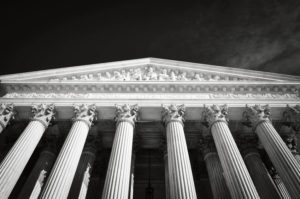Supreme, Obscene, and Everything in Between

It’s been one week since the US Supreme Court issued its 6-3 ruling in Bostock v. Clayton County, Georgia, making it illegal to fire someone for being gay or transgender by protecting LGBTQ Americans under Title VII of the 1964 Civil Rights Act. Smack dab in the middle of Pride Month and amidst nationwide demonstrations for racial justice, the decision was celebrated by all who care about equality. It was also a surprise to progressives—and a gut-punch to conservatives—that Justice Neil Gorsuch, the Federalist Society-anointed nominee who took Merrick Garland’s place on the highest court in the land, wrote the majority opinion.
But as LGBTQ activists and advocates have celebrated the landmark decision, we remain keenly aware of the ways gay, lesbian, and trans people in the US are still unsafe and unprotected. Inequities that exist outside of employment (in healthcare, for example) are still of great concern, as well as the challenges that will be made by employers claiming that antidiscrimination laws violate their religious freedom.
Three days before Bostock, the Department of Health and Human Services (HHS) rolled back a provision of the Affordable Care Act, introduced at the end of the Obama administration in 2016, that sought to protect transgender Americans in healthcare matters. That provision, which said that discrimination on the basis of sex included gender identity, had been challenged by the Trump administration, and on June 12, HHS’s Office for Civil Rights formally excluded gender identity from protection.
As many pointed out, this came during Pride Month and on the fourth anniversary of the mass shooting at the gay nightclub Pulse in Orlando, Florida. (What is it with the Trump administration doing obscene things on anniversaries of related obscene things?) In an interview with the New York Times on the day he announced the rollback, Roger Severino, the head of the HHS civil rights division (who once led the DeVos Center for Religion and Civil Society at the Heritage Foundation), said that it was “equivalent to housekeeping” for them to codify that LGBTQ Americans aren’t a protected class.
“So often trans people are the topic of debates over whether we get to be real and whether we deserve safety,” says Andy Semler, who is a member of the leadership council of the LGBTQ Humanist Alliance (a program of the American Humanist Association). “The attack on our access to healthcare by Trump followed by the confirmation that our employment rights are civil rights by the Supreme Court is a snapshot of the precarious lives we live in America: we’re constantly being affirmed and denied access to resources, attacked and defended in media sound bites.”
Tris Mamone, who serves with Semler on the alliance leadership council, echoes the push-and-pull nature of the fight for trans rights.
“Between JK Rowling’s transphobic screed, the murders of Dominique Fells and Riah Milton [two trans women killed on June 8 and 9, respectively], and the HHS rolling back healthcare protections for trans people, it looked like this was going to be the worst Pride Month ever,” they noted. “The Supreme Court ruling was a welcomed surprise and a ray of hope for these uncertain times. Naturally it’ll take more than just one SCOTUS ruling to fix everything, but at least it’s a step in the right direction.”
What’s next, we know, are the religious exemptions employers will surely seek. Under Title VII, businesses and organizations whose “purpose and character are primarily religious” can claim an exemption to antidiscrimination law. This covers churches and other houses of worship, as well as religiously affiliated universities and hospitals. (Although it’s hard to see how the latter’s primary purpose is religious.) Private businesses, like the Hobby Lobby arts and crafts chain owned by evangelical Christians who feel a calling to thwart employees’ rights, will continue to seek cover under the Religious Freedom Restoration Act and other religious freedom protections.
So, with a victory comes the reality of the ongoing legal landscape and a reminder to stay focused in the fight for civil rights. As Semler notes,
The Civil Rights Act of 1964, instrumental in the recent decision, hasn’t stopped the United States from devastating black communities and black livelihoods in the decades since. Yes, it’s a legal issue, but it’s also a heart issue. If we aren’t constantly affirming our fundamental right to safe and healthy shared spaces to live, work, and flourish, we will gain nothing.
